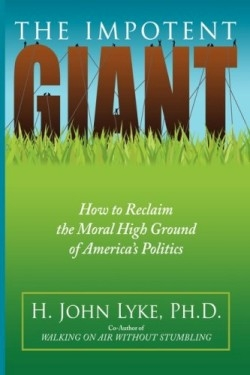The Impotent Giant
How to Reclaim the Moral High Ground of America's Politics
“A typical vice of American politics is the avoidance of saying anything real on real issues” Theodore Roosevelt once said. This sentiment lies behind H. John Lyke’s The Impotent Giant: How to Reclaim the Moral High Ground in America’s Politics which takes America’s elected officials to task for their failure to govern in a time of international and domestic crisis and its citizens to task for their failure to elect good leaders.
Lyke’s book reads much like an extended op-ed column arguing that America faced a crisis of leadership as President Bush and Congress sought to respond to the threat of terrorism. Lyke compares Bush’s leadership to that of former presidents Franklin Delano Roosevelt and Abraham Lincoln who argued for unity during economic and military crisis. He describes the nation as an “impotent giant”—a hapless overgrown giant fed by pork-barrel and defense spending and oblivious to the needs of others. In the final chapters Lyke offers suggestions for becoming a better citizen and identifying leaders who exhibit empathy sympathy and integrity.
The Impotent Giant represents Lyke’s first major foray into the analysis of current political events. A board-certified psychologist he is co-author of the self-help book Walking on Air Without Stumbling. Lyke’s political observations are influenced by his work as a psychologist and he provocatively argues that behaviors exhibited by President Bush are reminiscent of Attention Deficit Hyperactivity Disorder (ADHD) and dyslexia.
Lyke’s book is one of many examples of a new political activism by ordinary citizens in response to what they saw as a crisis of governance in the wake of 9/11. He writes “I have chosen to do this because I feel it’s my patriotic duty to do everything in my power to stop the senseless bloodshed the war in Iraq has evoked.” In a conversational style infused with truisms Lyke makes common sense observations about how a free society can never fully eradicate terrorism given how “complex and difficult it is to fight the amorphous threat of terrorism using conventional methods such as massive military power.”
One of the challenges of writing a book about the problems of the present is to resist the urge to idealize the past. Lyke writes “whenever Lincoln put on his political top and hat and played the part of a politician he was a master in employing all those qualities that make up political love. In that respect he was the quintessential politician.” The consequence of this romanticized vision of the past is that it glosses over the great tragedies that have shaped American identity: the brutalities of slavery the lawlessness of the Western frontier and the materialism of the Guilded Age.
At the end of the book Lyke speculates as to whether Lincoln could be elected for office today. One wonders whether he believes that President Obama is up to the task of elevating America’s status in the eyes of its citizens and of the world.
Disclosure: This article is not an endorsement, but a review. The publisher of this book provided free copies of the book and paid a small fee to have their book reviewed by a professional reviewer. Foreword Reviews and Clarion Reviews make no guarantee that the publisher will receive a positive review. Foreword Magazine, Inc. is disclosing this in accordance with the Federal Trade Commission’s 16 CFR, Part 255.

